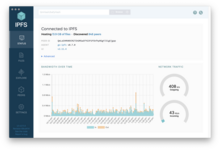 | |
| Original author(s) | Juan Benet and Protocol Labs |
|---|---|
| Developer(s) | Protocol Labs |
| Initial release | February 2015 (y) |
| Stable release | 0.32.1 / 15 November 2024; 51 days ago (15 November 2024) |
| Repository | github |
| Written in |
|
| Available in | Go, JavaScript, Python |
| Type | |
| License | MIT license, Apache license 2.0 |
| Website | ipfs.tech |
| Part of a series on |
| File sharing |
|---|
 |
| Technologies |
| Video on demand sites |
| BitTorrent sites |
| Academic/scholarly |
| File sharing networks |
| P2P clients |
| Streaming programs |
| Anonymous file sharing |
| Development and societal aspects |
| By country or region |
| Comparisons |
The InterPlanetary File System (IPFS) is a protocol, hypermedia and file sharing peer-to-peer network for storing and sharing data in a distributed hash table. By using content addressing, IPFS uniquely identifies each file in a global namespace that connects IPFS hosts, creating a resilient system of file storage and sharing.
IPFS allows users to host and receive content in a manner similar to BitTorrent. As opposed to a centrally located server, IPFS is built around a decentralized system of user-operators who hold a portion of the overall data. Any user in the network can serve a file by its content address, and other peers in the network can find and request that content from any node who has it using a distributed hash table (DHT).
In contrast to traditional location-based protocols like HTTP and HTTPS, IPFS uses content-based addressing to provide a decentralized alternative for distributing the World Wide Web.
IPFS is used in decentralized applications and content archiving.
Design
The InterPlanetary File System (IPFS) is a decentralized protocol, hypermedia, and peer-to-peer (P2P) network for distributed file storage and sharing. By using content-addressing, IPFS uniquely identifies files in a global namespace that interlinks IPFS hosts, creating a hypermedia system that enables efficient and reliable data distribution.
IPFS allows users to host and receive content in a manner similar to BitTorrent. As opposed to a centrally located server, IPFS is built around a decentralized system of user-operators who hold a portion of the overall data, creating a resilient system of file storage and sharing. Any user in the network can serve a file by its content address, and other peers in the network can find and request that content from any node who has it using a distributed hash table (DHT). In contrast to BitTorrent, IPFS aims to create a single global network. This means that if two users publish a block of data with the same hash, the peers downloading content from one user will also exchange data with those downloading it from the second.
Key features of IPFS include:
- Content-addressed file storage: Each file is uniquely identified based on its content hash, ensuring data integrity and facilitating efficient retrieval.
- Peer-to-peer architecture: A distributed network of nodes facilitates direct file sharing without the need for centralized servers.
- Versioned file system: Supports file versioning and allows users to track changes over time.
- Interoperability with distributed applications: IPFS seamlessly integrates with decentralized applications (dApps), offering a robust storage layer for blockchain and Web3 ecosystems.
IPFS aims to replace protocols used for static webpage delivery by using gateways that are accessible with HTTP. Users may choose not to install an IPFS client on their device and instead use a public gateway. A list of these gateways is maintained on the IPFS GitHub page.
Beyond providing an alternative for web hosting, IPFS is widely used in decentralized applications, scientific data sharing, and content archiving, serving as a foundational layer for the emerging decentralized internet.
History
IPFS was created by Juan Benet, who later founded Protocol Labs in May 2014. An alpha version was launched in February 2015, and by October of the same year was described by TechCrunch as "quickly spreading by word of mouth." Network service provider Cloudflare started using IPFS in 2018 and launched its own gateway in the system in 2022.
In March 2020, the Opera browser provided access to the centralized resources of the Unstoppable Domains provider by hosting content in IPFS.
Applications
- Filecoin is an IPFS-based cooperative storage cloud, also authored by Protocol Labs.
- The shadow libraries Anna's Archive and Library Genesis also deliver books via IPFS, enabling the largest online library of books to be more resilient.
- In 2018 the Internet Archive and Protocol Labs hosted a Decentralized Web summit, exploring applications of IPFS and other technologies to a fully decentralized internet. In 2022 the Archive explored putting the Wayback Machine data onto IPFS.
- Brave used Origin Protocol and IPFS to host its decentralized merchandise store and, in 2021, added support into their browser. (Support for local node IPFS was removed in 2024)
- Opera for Android has default support for IPFS, allowing mobile users to browse
ipfs://links to access data on the IPFS network.
ipfs-desktop app, created on Electron
Anti-censorship
- The Catalan independence referendum, taking place in September–October 2017, was deemed illegal by the Constitutional Court of Spain and many related websites were blocked. Subsequently, the Catalan Pirate Party mirrored the website on IPFS to bypass the High Court of Justice of Catalonia order of blocking.
- During the block of Misplaced Pages in Turkey, IPFS was used to create a mirror of Misplaced Pages, which allowed access to archived static Misplaced Pages content despite the ban. The mirror has now been expanded to more languages, such as English, Ukrainian, Russian, Arabic, and Chinese. A collection of the mirrors can be viewed by using its CID at an IPFS Gateway.
Malware
Phishing attacks have also been distributed through Cloudflare's IPFS gateway since July 2018. The phishing scam HTML is stored on IPFS, and displayed via Cloudflare's gateway. The connection shows as secure via a Cloudflare TLS certificate.
The IPStorm botnet, first detected in June 2019, uses IPFS so it can hide its command-and-control amongst the flow of legitimate data on the IPFS network. Security researchers had worked out previously the theoretical possibility of using IPFS as a botnet command-and-control system.
See also
References
- ^ Case, Amber (2015-10-04). "Why The Internet Needs IPFS Before It's Too Late". TechCrunch. Archived from the original on 2022-02-05. Retrieved 2019-07-16.
- "Release 0.32.1". 2024-11-15. Retrieved 2024-11-23.
- "agorise / c-ipfs". git.agorise.net.
- Benet, Juan (2014-07-14). "IPFS - Content Addressed, Versioned, P2P File System". arXiv:1407.3561 .
- ^ Finley, Klint (2016-06-20). "The Inventors of the Internet Are Trying to Build a Truly Permanent Web". Wired. ISSN 1078-3148. OCLC 24479723. Archived from the original on 2020-12-15. Retrieved 2017-03-07.
- ^ Krishnan, Armin (2020). "Blockchain Empowers Social Resistance and Terrorism Through Decentralized Autonomous Organizations". Journal of Strategic Security. 13 (1): 41–58. doi:10.5038/1944-0472.13.1.1743. ISSN 1944-0464. JSTOR 26907412.
- Youtube: Stanford Seminar - "IPFS and the Permanent Web"- Juan Benet of Protocol Labs Archived 2022-08-09 at the Wayback Machine Quote: "...The InterPlanetary File System (IPFS) is a new hypermedia distribution protocol, to complement--and eventually replace--HTTP. It improves the security, performance, operation modes, and data friendliness of the Web. In particular, it yields a powerful new model, where websites and web applications are decoupled from origin servers, are distributed trustlessly through the network, and are encrypted, authenticated, and executed safely..."
- Youtube: IPFS: Interplanetary file storage! Archived 2022-08-09 at the Wayback Machine
- Benet, Juan (2014). "IPFS - Content Addressed, Versioned, P2P File System". pp. 1–21. arXiv:1407.3561 .
- "IPFS powers the distributed web". Retrieved 2024-05-09. volume 1
- "Content addressing". docs.ipfs.tech. Archived from the original on 2020-08-29. Retrieved 2020-08-29.
- "IPFS Gateway". docs.ipfs.tech. Archived from the original on 2020-08-29. Retrieved 2020-08-29.
- "Public Gateway Checker | IPFS". GitHub. Archived from the original on 2020-08-24. Retrieved 2020-08-29.
- Benet, Juan (2014). "IPFS - Content Addressed, Versioned, P2P File System". arXiv:1407.3561 .
- "IPFS powers the distributed web". Retrieved 2024-05-09.
- "What is IPFS?". Retrieved 2024-05-09.
- "About". Protocol Labs. Archived from the original on 2021-04-28. Retrieved 2021-04-28.
- Johnson, Steven (2018-01-16). "Beyond the Bitcoin Bubble". The New York Times. ISSN 1553-8095. OCLC 1645522. Archived from the original on 2021-12-21. Retrieved 2018-09-26.
- ""Anna's Archive" Opens the Door to Z-Library and Other Pirate Libraries * TorrentFreak". TorrentFreak. Archived from the original on 2022-11-19. Retrieved 2023-01-08.
- "'Shadow Libraries' Are Moving Their Pirated Books to The Dark Web After Fed Crackdowns". VICE. Archived from the original on 2022-11-30. Retrieved 2023-01-08.
- "Web3 tech helps banned books on piracy site Library Genesis slip through the Great Firewall's cracks, but for how long?". South China Morning Post. 2022-04-16. Archived from the original on 2022-11-29. Retrieved 2023-01-08.
- "Internet Archive: Digital Library of Free & Borrowable Books, Movies, Music & Wayback Machine". archive.org. Retrieved 2024-04-16.
- oduwsdl/ipwb, ODU WS-DL, 2024-04-09, retrieved 2024-04-16
- Universal Access to All Knowledge: Decentralization Experiments at the Internet Archive. Retrieved 2024-04-16 – via archive.devcon.org.
- "Brave Launches New Swag Store Powered by Origin". Brave (Press release). 2020-03-24. Archived from the original on 2020-04-25. Retrieved 2020-04-21.
- Porter, Jon (2021-01-19). "Brave browser takes step toward enabling a decentralized web". The Verge. Archived from the original on 2021-02-26. Retrieved 2021-01-29.
- "Deprecate local node support and ipfs:// scheme · Issue #37735 · brave/brave-browser". GitHub. Retrieved 2024-09-01.
- "Opera introduces major updates to its blockchain-browser on Android". Opera (Press release). 2020-03-03. Archived from the original on 2020-04-02. Retrieved 2020-04-21.
- Balcell, Marta Poblet (2017-10-05). "Inside Catalonia's cypherpunk referendum". Eureka Street. Vol. 27, no. 20. ISSN 1833-7724. Archived from the original on 2021-09-15. Retrieved 2021-09-15.
- Hill, Paul (2017-09-30). "Catalan referendum app removed from Google Play Store". Neowin. Archived from the original on 2020-11-01. Retrieved 2017-10-06.
- Dale, Brady (2017-05-10). "Turkey Can't Block This Copy of Misplaced Pages". Observer. ISSN 1052-2948. Archived from the original on 2017-10-18. Retrieved 2017-12-20.
- Abrams, Lawrence (2018-10-04). "Phishing Attacks Distributed Through Cloudflare's IPFS Gateway". Bleeping Computer. Archived from the original on 2019-10-09. Retrieved 2019-08-31.
- Palmer, Danny (2019-06-11). "This unusual Windows malware is controlled via a P2P network". ZDNet. Archived from the original on 2019-09-06. Retrieved 2019-08-31.
- Patsakis, Constantinos; Casino, Fran (2019-06-04). "Hydras and IPFS: a decentralised playground for malware". International Journal of Information Security. 18 (6): 787–799. arXiv:1905.11880. doi:10.1007/s10207-019-00443-0. S2CID 167217444.
- Macabeus, Bruno; Vinicius, Marcus; Cavalcante, João Paolo; de Souza, Cidcley Teixeira (2018-05-06). Protocolos IPFS e IPNS como meio para o controle de botnet: prova de conceito. Workshop de Segurança Cibernética em Dispositivos Conectados (in Brazilian Portuguese). Archived from the original on 2021-01-17. Retrieved 2021-04-27 – via SBC Open Lib.
External links
| File systems | |||||||||||
|---|---|---|---|---|---|---|---|---|---|---|---|
| Disk and non-rotating |
| ||||||||||
| NAS | |||||||||||
| Specialized |
| ||||||||||
| Types | |||||||||||
| Features |
| ||||||||||
| Interfaces | |||||||||||
| Lists | |||||||||||
| Layouts | |||||||||||
| Internet censorship circumvention technologies | |||||||
|---|---|---|---|---|---|---|---|
| Background |
| ||||||
| Principles |
| ||||||
| Anti-censorship software |
| ||||||
| Anonymity |
| ||||||
| Physical circumvention methods | |||||||
| Relevant organizations | |||||||
| Reference | |||||||
| Italics indicates that maintenance of the tool has been discontinued. | |||||||
| Peer-to-peer file sharing | |||||||
|---|---|---|---|---|---|---|---|
| Networks, protocols |
| ||||||
| Comparisons of clients | |||||||
| Hyperlinks | |||||||
| Uses | |||||||
| Concepts |
| ||||||
| Internal technologies | |||||||
- Decentralized cloud computing
- Application layer protocols
- Internet properties established in 2015
- Distributed data storage
- Distributed file systems
- File transfer protocols
- Free network-related software
- Free software programmed in Python
- Internet privacy software
- Internet protocols
- Network protocols
- Peer-to-peer computing
- Hash-based data structures
- File sharing networks